Students need a break on the interest they're paying on their loans, says University of Northern British Columbia (UNBC) president George Iwama.
Reiterating statements he and the presidents of B.C.'s three other research universities have publicly made, Iwama said students pay a "substantial" 2.5 per cent plus prime, which is the highest in the country.
"It's an area where British Columbia can at least come up to par with regards to the rest of the country," Iwama said.
In contrast, Newfoundland-Labrador government eliminated interest on student loans in 2009.
According to the Canadian Federation of Students, the average B.C. graduate has $27,000 in student debt.
Following approval in March of a two-per-cent increase, a full-time undergraduate student at UNBC will pay $4,629 per year in tuition, a $90 increase. Iwama said the hike was needed in the face of rising energy costs, a zero increase in the grant from the provincial government and flat enrollment over the last few years.
"Adding to the burden is not something we relish but financially, it's something which will help the university and together with good fiscal management we haven't had to take any drastic measures with regard to our staff and positions at the university," he said.
A decline in interest rates would yield a larger saving for students, Iwama maintained.
"Students as they they graduate and join the work force, to be starting your young career with a debt burden is no fun for anybody," he said.
Iwama was joined by Stephen Toope of the University of B.C., Andrew Petter of Simon Fraser University, David Turpin of the University of Victoria in talking to the editorial board. The four have not been directly communicated to Advanced Education Minister Naomi Yamamoto.
In a statement, Yamamoto said her ministry is conducting a review with the possibility of changes this fall.
"We welcome ideas and suggestions from all our stakeholders and I look forward to seeing what the university presidents bring forward," she said.



